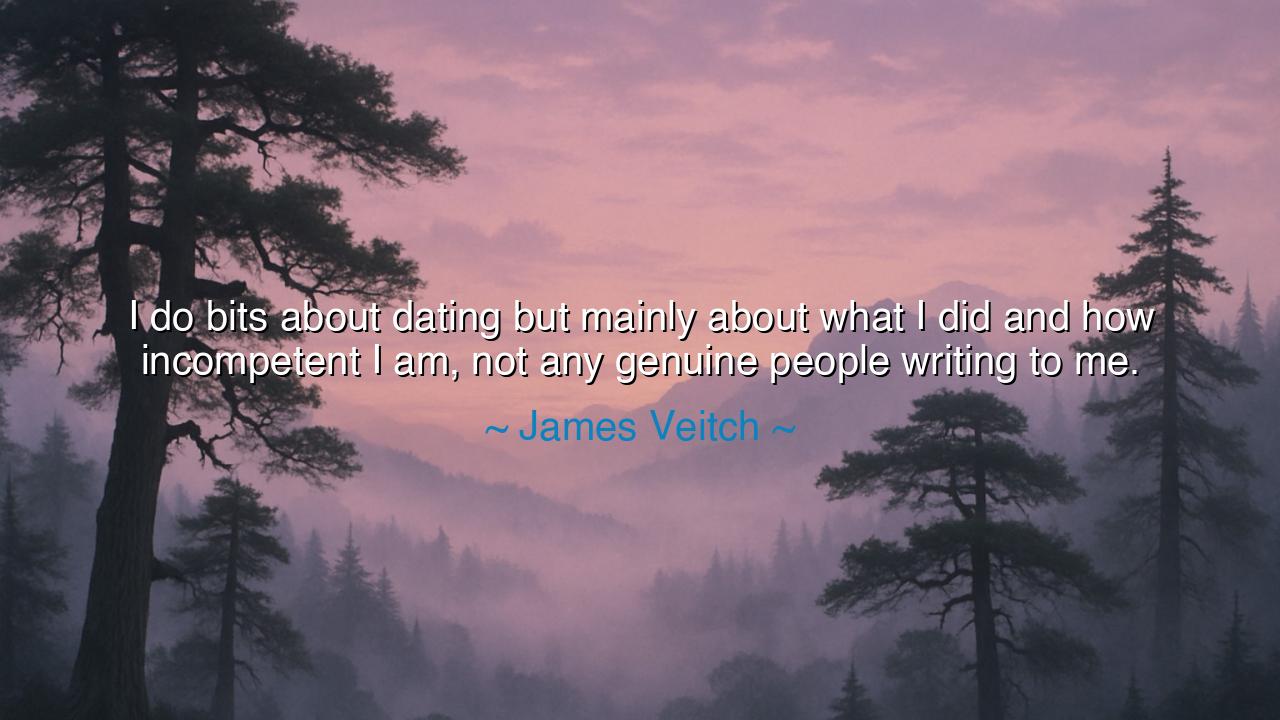
I do bits about dating but mainly about what I did and how
I do bits about dating but mainly about what I did and how incompetent I am, not any genuine people writing to me.






In the marketplaces of laughter, where words are juggled like bright knives, a modest rule preserves the peace of the crowd: “I do bits about dating but mainly about what I did and how incompetent I am, not any genuine people writing to me.” So speaks James Veitch, and the saying rings like a small bell of conscience. Its music is self-aimed mirth—humor as a mirror turned inward, not a spear hurled outward. The comic stands upon the public square and offers his own mishaps as tribute, keeping the names of others veiled. This is not merely style; it is a code.
Hear the twin pillars in his confession: first, the choice of material—dating, the foibles of pursuit, the errors of everyday courage; second, the direction of the joke—mainly upon what I did, and the cheerful admission of being incompetent. Ancient teachers would nod: better the city’s jester who bruises his own pride than the satirist who harvests cruelty from passersby. For laughter can heal, but it can also humiliate; and the line is crossed when a performer drags the unconsenting into the torchlight. Thus the pledge: not any genuine people writing to me. Real voices are not fodder; they are neighbors whose dignity must be kept.
Self-mockery, rightly practiced, is a wise discipline. It frees the teller from the tyranny of image and makes room for fellowship. When a comic says, “Behold my stumble,” the audience answers, “Ah, brother!” The distance between stage and seat collapses; we gather around a shared clumsiness and discover mercy hiding inside the laugh. The ancients kept a similar rite: the fool of the feast wore bells and confessed the household’s minor absurdities, so that truth might be spoken without blood and the year might turn unpoisoned.
Consider a tale from the old books: Nasreddin Hodja, the folk trickster, once searched under a lamp for a ring he had lost in the dark. “Why look here?” asked his neighbors. “Because the light is better,” he said. The joke is gentle, and the fool is the butt; yet in mocking himself he instructs the village: we prefer easy places to true places. No citizen is shamed by name; no private sorrow is paraded. In the same spirit, Veitch’s creed keeps the lamp on his own misadventures. The lesson lands because the wound shown is the speaker’s, freely offered.
Take also a more recent parable. A young performer—call her Mira—built a set around mocking an ex who had once written her ornate, awkward emails. The laughs were thunderous, but afterward a friend asked, softly, whether the ex had agreed to be a public character. Mira slept poorly; the next month she returned with a new hour, every story sworn upon her own errors: the confession of a misread text, a misplaced date, a calamity of auto-correct. The laughs grew warmer, rounder; strangers lingered to say, “I’ve done that.” She had moved from exhibition to communion. The mirth had turned ethical.
What, then, is the wisdom this quote bequeaths? Aim the punchline where consent is complete: at yourself. Choose bits that distill the human condition from your own spills and splinters. Treat “genuine people” as sacred guests, not raw material. Humor that preserves the face of the other becomes a public good; it trains a culture toward compassion while still stripping pretense from the teller. And strangely, self-aimed humor enlarges courage: the one who can laugh at his own incompetence is free to try again, to love again, to live without the armor of perfection.
Let the counsel be plain for apprentices of the word. First, build from what I did: keep a log of your stumbles and the truths they revealed. Second, obtain consent before naming the living; where consent cannot be had, change details until identity disappears—or better, change the subject. Third, practice “punch up, not down”: target systems, vanities, and your own errors, not the powerless or the private. Fourth, rehearse humility: after each set, ask, “Did the laugh cost someone their dignity?” If yes, retire the piece. Fifth, let your dating tales be lanterns, not knives—jokes that make the awkward holy.
Do this, and your stage will become a commons where people are safe to recognize themselves. Your laughter will be a river that polishes stones without breaking them. And when the night is over and the torches are dim, you will have kept faith with the oldest charter of comedy: to tell the truth with kindness, to comfort the afflicted—including the one on the microphone—and to afflict only the pride that keeps us from each other.






AAdministratorAdministrator
Welcome, honored guests. Please leave a comment, we will respond soon